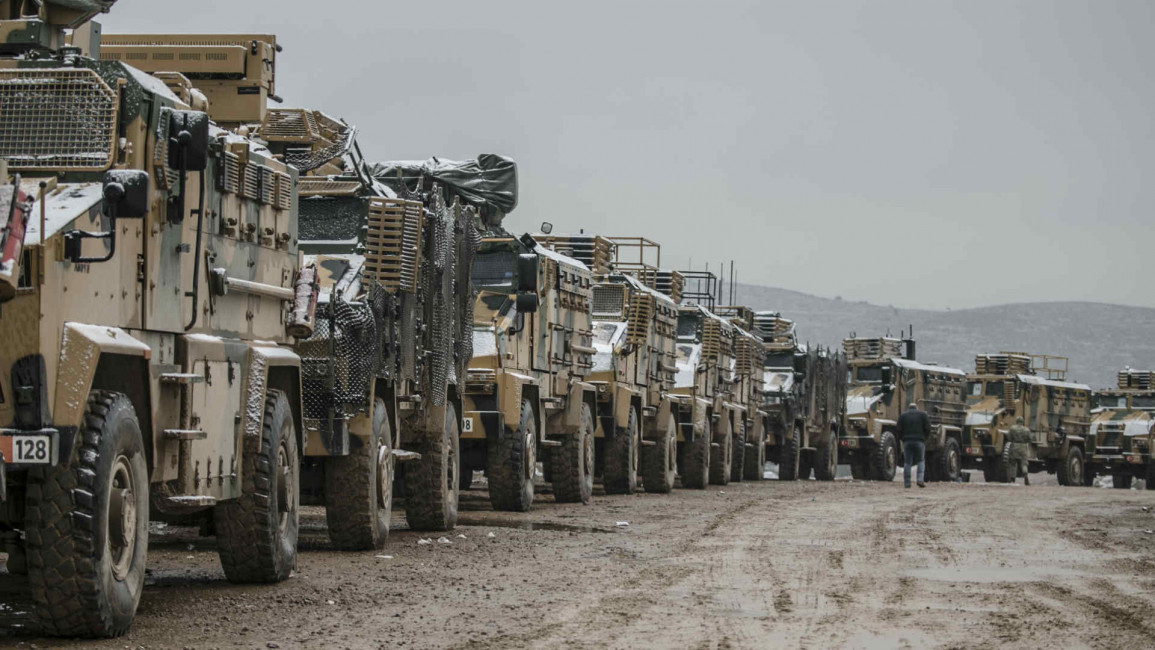Turkey confirms military operation against Syrian regime as tensions soar
Though Turkey has reported striking targets in Syria since dozens of its troops were killed there Thursday, it was the first confirmation of a full and continuing operation.
"Following the heinous attack on February 27 in Idlib, operation 'Spring Shield' successfully continues," Turkish Defence Minister Hulusi Akar said in a televised speech.
"We don't have the desire or intention to clash with Russia," the minister added. Thirty-four Turkish troops have been killed in Syria since Thursday.
"Our intention is to stop the regime's massacres, and prevent... migration," he said.
"We expect Russia to stop the regime's attacks and to use their influence to ensure the regime withdraws to the borders of the Sochi agreement."
Read also: Syria Weekly: Turkey retaliation blocks regime's advance in Idlib
Turkey has 12 observation posts established in rebel-held Idlib following a 2018 deal between Ankara and Moscow signed in the Black Sea resort of Sochi.
But the regime recently has pressed ahead with an assault, killing hundreds of civilians and forcing nearly a million to flee from their homes in the region.
Rebel-supporter Turkey and Damascus ally Russia previously worked closely to prevent a regime offensive in Idlib despite being on opposing sides of the nine-year war.
Turkish President Recep Tayyip Erdogan last month warned Damascus to get behind the agreed borders otherwise Ankara would use military force to push the regime back.
Akar said Turkish forces had destroyed dozens of tanks, helicopters and howitzers, adding 2,212 regime troops had been "neutralised".
Twitter Post
|
According to the Syrian Observatory for Human Rights war monitor, 26 Syrian soldiers were killed in Turkish drone strikes on Saturday.
Erdogan on Saturday called on Russia to "get out of our way" in Idlib and leave Turkey "face to face with the regime" in Idlib.
The latest developments has strained relations between Ankara and Moscow but Erdogan will likely meet Russian President Vladimir Putin for talks on Thursday or Friday, according to the Kremlin.
The UN says nearly a million people - half of them children - have been displaced by the fighting in northwest Syria since December, forced to flee in the bitter cold.
Ceasefire blocked
Meanwhile, Russia and China rejected calls for a ceasefire in Syria at an emergency UN Security Council meeting on Friday.
The UN chief made the appeal after air strikes in the last opposition stronghold in Idlib killed at least 33 Turkish troops on Thursday.
The attack heightened tensions between pro-opposition Turkey and Russia, and raised the possibility of an all-out war with millions of Syrian civilians trapped in the middle.
Guterres said he's been in very close contact with Russia and Turkey, appealing for a cease-fire in the Idlib region but "we are not yet there".
"Without urgent action," he warned, "the risk of even greater escalation grows by the hour".
The four European Union council members - France, Germany, Belgium and Estonia - said in a joint statement that "the military escalation in Idlib must stop".
"We demand an end to this Syrian military campaign supported by Russia, and fully back the calls made by the UN secretary-general for an immediate ceasefire and unimpeded humanitarian access," they said.
"We strongly urge the UN to accelerate and intensify their engagements with all relevant parties to secure an immediate cease-fire effort in northwest Syria."
The four EU countries requested the emergency meeting along with the United Kingdom, United States and Dominican Republic.
Agencies contributed to this report.
Follow us on Facebook, Twitter and Instagram to stay connected



